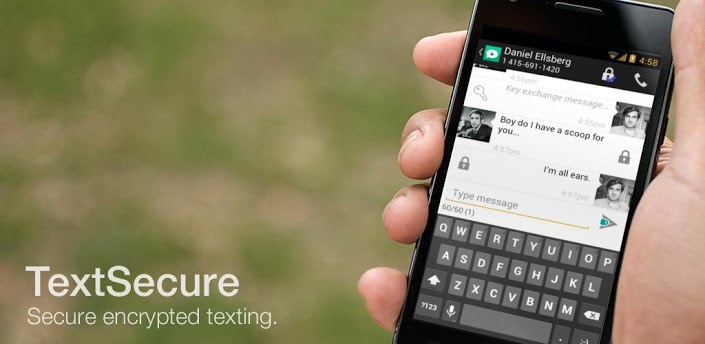Following the revelations of Edward Snowden on a surveillance program run by the National Security Agency to spy on individuals’ online activities and communication, a host of SMS encryption services became an in-demand product. But TextSecure, one of the pioneers in this area, is dropping support for encrypted text messages.

Open Whisper Systems, creator of the TextSecure messaging product, has announced recently that it will no longer maintain the product. For valid reasons that have something to do with the changing technology and regulatory landscape.
First, the TextSecure messaging product will be migrated to Open Whisper Systems’ own transport protocol for security purposes. Open Whisper Systems believes that text messages routed through the networks of carriers in the United States and the rest of the world are exposed to third-party prying eyes. That is so because an SMS leaves traces in every place it is routed through, thus easily detectable under the radar of surveillance programs.
As text messages traverse carrier infrastructure, the metadata – the sensitive part of your message that is not explicitly visible – is being disclosed to the carriers themselves. This is in stark contrast to the idea of encryption, which means total protection from unauthorized access.
In other words, TextSecure is dropping support for encrypted messaging because it is trying to elevate the level of security for private messages. By switching to its own transport protocol, TextSecure will fix security concerns of users. Gone are the days when the focus of encryption for TextSecure is on SMS alone. Now, after so many changes in the technology world, the TextSecure app will aim to focus on the use of data instead of the SMS.
Another reason for TextSecure’s move into its own data protocol is to be compatible with the iOS ecosystem. Open Whisper Systems recently launched Signal, an app for iPhone users that has the same function as TextSecure. Signal for iPhone includes support for TextSecure-encrypted messages.
Since the TextSecure transport protocol is using data instead of the SMS, users can have easy access to the messages and read the same with less cost compared to using the services of carriers at high costs. So this is more economical, to put more frankly. Does this spell the beginning of the carrier infrastructure’s end? Anybody can guess.
As it is dropping support for encrypted messages, TextSecure will see its terminus upon the release of the version 2.7.0 of the app.




Tim H says
Small typo: It’s 2.7.x that will drop the Encrypted SMS support.
It’s also important to note that TextSecure will _still function_ as an SMS app, so you still get a secure container for all your SMS messages (someone who picks up your phone won’t be able to read messages without the passcode)
Joe says
Sad news for app users worldwide. Why not leave the feature in and simply make it selectable? App-type software is so poor. You can’t configure anything to suit your needs.
Anom says
This project (textsecure) has been compromised for a few years now. Moxie, all of a sudden, after being harrased in airoports by the government, has now gotten a major deal to secure What’s up. In addition, in 2013-2014 Open Whisper received over $1 million from BBG (which is the government) for his good work.
Here is a little history. Encrypted sms based on OTR is virtually unbreakable even if you have the device. Now, obviously, this didn’t play well with certain three letter agencies. Hence, harrasments in airoports. Then, Moxie introduces Google proprietary binaries into his app. Now, you must have Google apps, including Google Services Framework, which is known to regulary call home (Google) to transmit data. Then, he removes the ability of the user to regenerate their identity keys. Then, he concentrates on data messages, as opposed to sms saying that Google servers are more secure than carriers. So, Google Services Framework gets all your data before or after it was decrypted/encrypted. So, his app continues to be open source, while GSF has access to everything. But here is a problem: more and more people are able to compile the app and use it as sms only without invasive Google apps. So, no good, hence, Moxie (and his new sponsors) decide to drop sms for good…
David says
Do NOT upgrade if you are on a Text Secure version v2.6.x or before
If you do, Moxie (lead developer) has removed SMS Encryption after v2.6.x
This release log information is NOT visible on the Google Playstore
when you try to upgrade. Moxie the Moron doesn’t want people to know he
has removed the SMS Encryption after v2.6.4 otherwise no one would
upgrade.
Since Moxie (the utter Moron) has removed SMS Encryption (for no real
reason except to cement a deal with WhatsApp) after version v2.6.4,
there is no point using Text Secure any more
Moxie the Moron has put self interest using an open source platform ahead of maintaining E2E SMS Encryption for all
I suggest to ‘uninstall’ Text Secure and use the more stable Open Source platforms
– Chat Secure (Open Source) – E2E IM Encryption – more feature rich and stable than Text Secure.
Can be downloaded and installed with the Google Playstore (unlike crappy Text Secure)
https://chatsecure.org
– SMS Secure (Open Source) – E2E SMS Encryption
Can be downloaded and installed with the Google Playstore (unlike crappy Text Secure)
https://smssecure.org
Plonk! … there goes my uninstall of Text Secure after 3 years
Hope to never use another of your products Moxie the Moron !!!